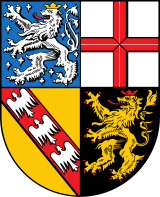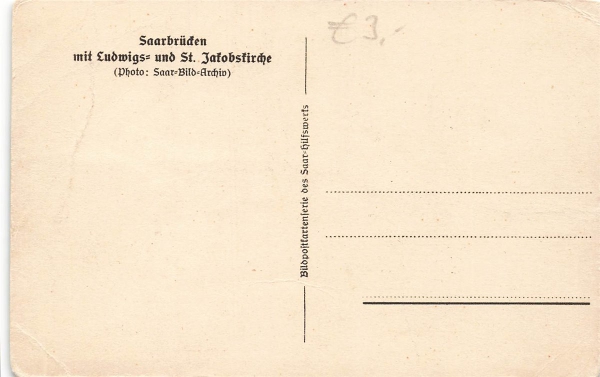Saarland
Saarland is a state in the southwest of the Federal Republic of Germany. The smallest of the non-city states and the second smallest state in terms of population with just under one million (after Bremen) borders in the north and east on the state of Rhinel and-Palatinate, in the south on the French region of Grand Est with its Moselle department and in the west on the Grand Duchy of Luxembourg . Together with these neighbors and the Belgian region of Wallonia, Saarland forms the greater European region of Saar-Lor-Lux, in which around 11.6 million people live. Saarland is characterized by a high degree of industrialization and a well-developed infrastructure. The region has the highest cross-border mobility of workers in the European Union.[6] State capital, largest city and regional center of Saarland is Saarbrücken. After administrative and constitutional pre-forms since the 7th century (Franconian district of Saargau) and the 17th century (Duchy of Saarland, Saar province and Saar department), Saarland came into being on January 10, 1920 as a political unit Saar (Basin) area (Territoire du Bassin de la Sarre) as a result of the Versailles Treaty. It was spun off from the state authority of the Weimar Republic and existed for 15 years with its own constitution and with the international government commission appointed by the Council of the League of Nations as a League of Nations mandate. At the urging of the population, a provincial council was set up in 1922 as an advisory representative body. In 1935, after the Saar vote provided for in the treaty, the Saar region was reintegrated into the German Reich as Reichsland Saarland, at that time under National Socialist government, based on around 90 percent approval. After the Second World War, the Saarland became part of the French occupation zone after the creation of the Saar Regional Council. France subsequently spun it off and removed it from the jurisdiction of the Allied Control Council. The governments of the United States of America and the United Kingdom of Great Britain and Northern Ireland in particular prevented a complete annexation of the area on the Saar by France after the two world wars of the 20th century - in the latter case also the government of the Soviet Union.
and-Palatinate, in the south on the French region of Grand Est with its Moselle department and in the west on the Grand Duchy of Luxembourg . Together with these neighbors and the Belgian region of Wallonia, Saarland forms the greater European region of Saar-Lor-Lux, in which around 11.6 million people live. Saarland is characterized by a high degree of industrialization and a well-developed infrastructure. The region has the highest cross-border mobility of workers in the European Union.[6] State capital, largest city and regional center of Saarland is Saarbrücken. After administrative and constitutional pre-forms since the 7th century (Franconian district of Saargau) and the 17th century (Duchy of Saarland, Saar province and Saar department), Saarland came into being on January 10, 1920 as a political unit Saar (Basin) area (Territoire du Bassin de la Sarre) as a result of the Versailles Treaty. It was spun off from the state authority of the Weimar Republic and existed for 15 years with its own constitution and with the international government commission appointed by the Council of the League of Nations as a League of Nations mandate. At the urging of the population, a provincial council was set up in 1922 as an advisory representative body. In 1935, after the Saar vote provided for in the treaty, the Saar region was reintegrated into the German Reich as Reichsland Saarland, at that time under National Socialist government, based on around 90 percent approval. After the Second World War, the Saarland became part of the French occupation zone after the creation of the Saar Regional Council. France subsequently spun it off and removed it from the jurisdiction of the Allied Control Council. The governments of the United States of America and the United Kingdom of Great Britain and Northern Ireland in particular prevented a complete annexation of the area on the Saar by France after the two world wars of the 20th century - in the latter case also the government of the Soviet Union.
 and-Palatinate, in the south on the French region of Grand Est with its Moselle department and in the west on the Grand Duchy of Luxembourg . Together with these neighbors and the Belgian region of Wallonia, Saarland forms the greater European region of Saar-Lor-Lux, in which around 11.6 million people live. Saarland is characterized by a high degree of industrialization and a well-developed infrastructure. The region has the highest cross-border mobility of workers in the European Union.[6] State capital, largest city and regional center of Saarland is Saarbrücken. After administrative and constitutional pre-forms since the 7th century (Franconian district of Saargau) and the 17th century (Duchy of Saarland, Saar province and Saar department), Saarland came into being on January 10, 1920 as a political unit Saar (Basin) area (Territoire du Bassin de la Sarre) as a result of the Versailles Treaty. It was spun off from the state authority of the Weimar Republic and existed for 15 years with its own constitution and with the international government commission appointed by the Council of the League of Nations as a League of Nations mandate. At the urging of the population, a provincial council was set up in 1922 as an advisory representative body. In 1935, after the Saar vote provided for in the treaty, the Saar region was reintegrated into the German Reich as Reichsland Saarland, at that time under National Socialist government, based on around 90 percent approval. After the Second World War, the Saarland became part of the French occupation zone after the creation of the Saar Regional Council. France subsequently spun it off and removed it from the jurisdiction of the Allied Control Council. The governments of the United States of America and the United Kingdom of Great Britain and Northern Ireland in particular prevented a complete annexation of the area on the Saar by France after the two world wars of the 20th century - in the latter case also the government of the Soviet Union.
and-Palatinate, in the south on the French region of Grand Est with its Moselle department and in the west on the Grand Duchy of Luxembourg . Together with these neighbors and the Belgian region of Wallonia, Saarland forms the greater European region of Saar-Lor-Lux, in which around 11.6 million people live. Saarland is characterized by a high degree of industrialization and a well-developed infrastructure. The region has the highest cross-border mobility of workers in the European Union.[6] State capital, largest city and regional center of Saarland is Saarbrücken. After administrative and constitutional pre-forms since the 7th century (Franconian district of Saargau) and the 17th century (Duchy of Saarland, Saar province and Saar department), Saarland came into being on January 10, 1920 as a political unit Saar (Basin) area (Territoire du Bassin de la Sarre) as a result of the Versailles Treaty. It was spun off from the state authority of the Weimar Republic and existed for 15 years with its own constitution and with the international government commission appointed by the Council of the League of Nations as a League of Nations mandate. At the urging of the population, a provincial council was set up in 1922 as an advisory representative body. In 1935, after the Saar vote provided for in the treaty, the Saar region was reintegrated into the German Reich as Reichsland Saarland, at that time under National Socialist government, based on around 90 percent approval. After the Second World War, the Saarland became part of the French occupation zone after the creation of the Saar Regional Council. France subsequently spun it off and removed it from the jurisdiction of the Allied Control Council. The governments of the United States of America and the United Kingdom of Great Britain and Northern Ireland in particular prevented a complete annexation of the area on the Saar by France after the two world wars of the 20th century - in the latter case also the government of the Soviet Union.
1 to 1 (from a total of 1)
.png)

